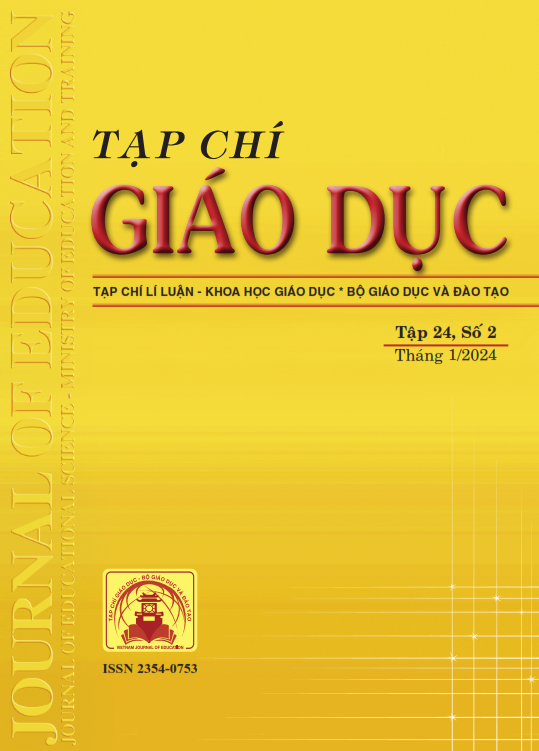Thực trạng nhận thức và thực hành đánh giá học sinh của giáo viên tiểu học theo tiếp cận năng lực
Tóm tắt
Currently, although primary schools have made efforts to implement competency assessment activities according to the guidance of the Ministry of Education and Training, understanding of this approach in the Vietnamese educational context is still limited. This article was written to increase awareness and knowledge in the educational community about competency assessment practices, while also providing valuable information for teachers and educational management agencies. The results show that teachers have positive perceptions and recognize the detail and multi-dimensionality of competency assessment information, helping them have a comprehensive view of student development. However, there are still some teachers who need to improve to reach a level of proficiency and confidence in applying this method. In addition, the study also evaluated the frequency with which teachers apply forms of assessment and some methods are not really implemented on a regular basis. This requires the government to shape policies, provide support and create conditions for continuous improvement in the area of assessment of primary school teachers' competencies as well as change and efforts on the part of schools. and the teachers themselves.
Tài liệu tham khảo
Ashton, P., & Crocker, L. (1987). Systematic study of planned variations: The essential focus of teacher education reform. Journal of Teacher Education, 38(3), 2-8.
Ban Chấp hành Trung ương (2013). Nghị quyết số 29-NQ/TW ngày 04/11/2013 về đổi mới căn bản, toàn diện giáo dục và đào tạo, đáp ứng yêu cầu công nghiệp hóa, hiện đại hóa trong điều kiện kinh tế thị trường định hướng xã hội chủ nghĩa và hội nhập quốc tế.
Bộ GD-ĐT (2020). Thông tư số 27/2020/TT-BGDĐT ngày 04/9/2020 về quy định đánh giá học sinh tiểu học. Borg, S. (2003). Teacher cognition in language teaching: A review of research on what language teachers think, know, believe, and do. Language Teaching, 36(2), 81-109. https://doi.org/10.1017/S0261444803001903
Cizek, G. J., Fitzgerald, S. M., & Rachor, R. A. (1995). Teachers’ Assessment Practices: Preparation, Isolation, and the Kitchen Sink. Educational Assessment, 3(2), 159-179. https://doi.org/10.1207/s15326977ea0302_3
Ellis, E. M. (2012). Language awareness and its relevance to TESOL. University of Sydney Papers in TESOL, 7, 1-23. Gates, G. S. (1922). An experimental study of the growth of social perception. The Journal of Educational Psychology, 14, 449-461.
Hammerness, K., Darling-Hammond, L., Bransford, J., Berliner, D., Cochran-Smith, M., McDonald, M., & Zeichner, K. (2008). How teachers learn and develop. In L. Darling-Hammond & J. Bransford (Eds.), Preparing teachers for a changing world: What teachers should learn and be able to do (pp. 358-389). San Francisco, CA: Jossey-Bass.
Thompson, A. G. (1992). Teachers’ beliefs and conceptions: A synthesis of the research. In D. A. Grouws (Ed.), Handbook of research on mathematics teaching and learning. New York: MacMillan.
Tải xuống
Đã Xuất bản
Cách trích dẫn
Số
Chuyên mục
Giấy phép

Tác phẩm này được cấp phép theo Ghi nhận tác giả của Creative Commons Giấy phép quốc tế 4.0 .












